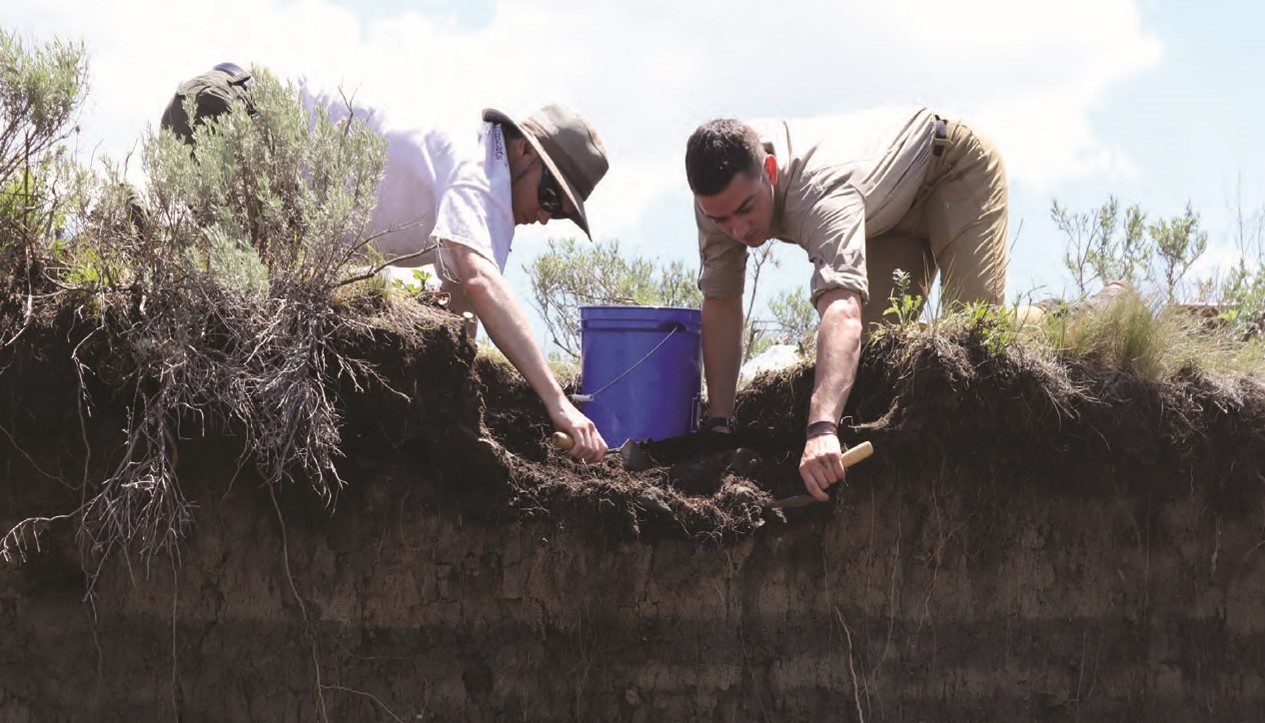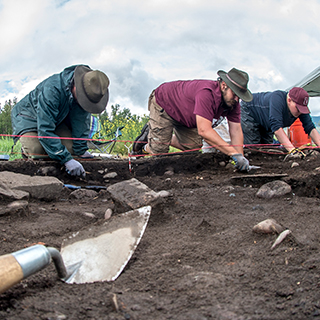Field School and Field Experience
Field experiences are essential to undergraduate and graduate training in anthropological archaeology. The Department of Anthropology at The University of Montana offers a diverse range of opportunities for students to gain experience and collect college credit through participation in archaeological field schools. Whether studying the ancient Mayans, peoples of the historic American west, or indigenous hunter-gatherers of the Rocky Mountains and Pacific Northwest, students have the opportunity to develop and hone their skills in field archaeology while thinking about archaeological interpretation and its implications for today’s descendant communities.
Archaeological field schools provide critical hands-on training and experience necessary for gaining employment or advancing academically in archaeology. Field schools at The University of Montana offer credits towards an anthropology major or minor. Field school credits can also be applied towards “Methods” within the undergraduate archaeology option. Many archaeological field schools are held in other countries providing students with international experiences. As many archaeological projects are conducted as collaborative partnerships with indigenous stakeholders, students may also gain experience living and working within non-western cultures.

2024 University of Montana Archaeological Field School in Yellowstone National Park
ANTY 495 (Section 3): Yellowstone Archaeological Field School
Dates: June 22 to July 23, 2024
Cost: 5 credits UM Summer tuition plus a $912 fee (covers food, travel, logistics)
We are only taking 8-10 students, so sign up early! You will need to contact Prof. MacDonald who will do an override on Cyberbear so you can enroll. Douglas.macdonald@umontana.edu
Part 1: June 22 to July 1, Archaeological Survey, Yellowstone National Park
Travel logistics: The crew will meet at noon, on Saturday, June 22, at a TBD location and travel together in UM and personal vehicles to the camp location in Yellowstone. Students can drive themselves but should talk to Prof. MacDonald before doing so (to arrange logistics for vehicle parking, etc…).
Camping logistics: camping is car-based (not backcountry), so no need to pack light. I want everyone to be comfortable in their camping experience. Everyone will need a tent, sleeping pad, sleeping bag, etc… We will camp at the Norris Geyser Basin campground about 1 hour south of Gardiner, Montana. Tents should be sufficient to withstand a strong, windy thunderstorm. Bring a variety of clothing, including raincoats and jackets.
Food logistics: UM will provide food cooking equipment. Using your fee money, I will purchase food and the crew will take turns cooking dinner and cleaning. Breakfast and lunch will be cold. We will not have a huge food budget, so can’t accommodate extremely restrictive diets, unfortunately. Students with such diets can bring their own food to supplement that provided by UM.
Archaeology Logistics: Crews will learn modern archaeological survey methods in order to identify the locations of important Native American and Euro-American archaeological sites. UM will provide all necessary equipment. A small backpack is recommended for field gear and lunch transport to and from camp to the survey area.
Break: July 2 to July 6
We will take a five-day break over the July 4th holiday. UM vehicles will transport students back to Missoula. Alternatively, students can stay at camp in Yellowstone but will be responsible for their own transportation, and meals.
Part 2: July 7-July 23, Archaeological Excavation, Yellowstone National Park
Travel logistics: The crew will meet at noon, Sunday, July 7, at a TBD location and travel together to the camp location; the crew will return on July 23 at the end of the day
Camping logistics: camping is car-based, so no need to pack light. Everyone will need a tent, sleeping pad, sleeping bag, etc… We will camp at the Norris Geyser Basin campground about 1 hour south of Gardiner, Montana. Tents should be sufficient to withstand a strong, windy thunderstorm.
Food logistics: UM will provide food cooking equipment. Using your fee money, I will purchase food and the crew will take turns cooking dinner and cleaning. Breakfast and lunch will be cold. We will not have a huge food budget, so can’t accommodate restrictive diets, unfortunately.
Archaeology Logistics: Crews will learn modern archaeological excavation methods in order to evaluate site importance. UM will provide all necessary equipment. Our focus will be on a handful of Native American pre-contact sites at the headwaters of the Gibbon River in central YNP. Given the proximity of Obsidian Cliff, we anticipate finding lots of tool production artifacts. Students will need a clipboard, hand trowel, metric measuring tape, and small line level, but UM will have extras of these as well. A small backpack is recommended for field gear and lunch transport to and from camp to the sites.
Required Books: buy on Amazon or check out of the library
Before Yellowstone (2018)
Project Leader: Professor Doug MacDonald, douglas.macdonald@umontana.edu,
Student Assistants: Sean Bowerbank sean.bowerbank@umconnect.umt.edu; Andrew Ballantyne andrew.ballantyne@umconnect.umt.edu
